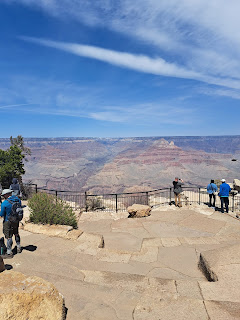Introduction
As many of our readers know, we have a Qur'an study session weekly, an activity that has been taking place for years at locations where I am teaching. In addition, over the years I have joined other study circles in which aspects of scripture are explored. These sort of activities are very rewarding, and often provides the foundation for which we can begin to contemplate further, explore deeply, and attain the ingredients for spiritual and even worldly growth.
The following is an edited version of my notes from a session we conducted September 21st, 2025 at Masjid Ibrahim. We have this session every week in person, it is open to all, and is broadcast live on our Facebook page ("The Masjid Ibrahim"). We have endeavored to present further clarity on the concepts explored in that session in the body of our current article. Please note that I do not intend to present this as an authoritative Tafseer (exegesis) that excludes other views. Our reflection could frankly be incorrect, thus, we always need to have the intellectual caveat that is captured in the expression Allahu A'lam or God knows best.
The text below comes from the opening words of the fifty-forth chapter of the Qur'an, known as Soorah Al-Qamar, the title translating simply to "The moon", It is important to note that while the translation has not been given here (at least not word-by-word), the article highlights the need for contextual reading as well as deriving as much of the meanings from the overarching Quranic vocabulary found throughout the sacred text. Bismillaahir Rahmaaner Raheem
In the name of Allah, The Compassionate, The Ever-Merciful
ٱقْتَرَبَتِ ٱلسَّاعَةُ وَٱنشَقَّ ٱلْقَمَرُ
وَإِن يَرَوْا۟ ءَايَةًۭ يُعْرِضُوا۟ وَيَقُولُوا۟ سِحْرٌۭ مُّسْتَمِرٌّۭ
وَكَذَّبُوا۟ وَٱتَّبَعُوٓا۟ أَهْوَآءَهُمْ ۚ وَكُلُّ أَمْرٍۢ مُّسْتَقِرٌّۭ
وَلَقَدْ جَآءَهُم مِّنَ ٱلْأَنۢبَآءِ مَا فِيهِ مُزْدَجَرٌ
حِكْمَةٌۢ بَـٰلِغَةٌۭ ۖ فَمَا تُغْنِ ٱلنُّذُرُ
فَتَوَلَّ عَنْهُمْ ۘ يَوْمَ يَدْعُ ٱلدَّاعِ إِلَىٰ شَىْءٍۢ نُّكُرٍ
خُشَّعًا أَبْصَـٰرُهُمْ يَخْرُجُونَ مِنَ ٱلْأَجْدَاثِ كَأَنَّهُمْ جَرَادٌۭ مُّنتَشِرٌۭ
مُّهْطِعِينَ إِلَى ٱلدَّاعِ ۖ يَقُولُ ٱلْكَـٰفِرُونَ هَـٰذَا يَوْمٌ عَسِرٌۭ
كَذَّبَتْ قَبْلَهُمْ قَوْمُ نُوحٍۢ فَكَذَّبُوا۟ عَبْدَنَا وَقَالُوا۟ مَجْنُونٌۭ وَٱزْدُجِرَ فَدَعَا رَبَّهُۥٓ أَنِّى مَغْلُوبٌۭ فَٱنتَصِرْ
Verses 1-4) The traditional understanding of the opening words of this Soorah is that the moon was split, (thus, wanshaqqal Qamar) for all to see, in the Prophet’s time, to prove the veracity of his message. The term “hour” (As-saa’ah) is understood in eschatological terms. In opening the study of this text regarding time, we should remember that time-as we conceive it-has no impact on God. The Qur’an tells us that a day in the sight of Allah is like a thousand years of our counting ( Q 22:47 and 32:5).
While Qur’an (75:9) definitely asserts that the sun and moon will be brought together, an indicator of the coming day of judgement, there seems to be some flexibility in the interpretation of the present verses. The nearness of the hour and the cleaving of the moon (iqtarabat as saa’atu wanshaqqal Qamar) can be understood as referring to the brightness, beauty and relevance of the Prophet’s mission. It is as clear as the moonlight as in the evening sky.
The brightness of the message is clear to those who are willing to simply look, to investigate and contemplate, yet, the obstinate rejectors dismiss it as “magic”. Rather than denying the light in some rational fashion, they try to cover it up.
“They want to extinguish Allah’s light with their mouths, yet Allah perfects His light, regardless of the hatred of the Kaafiroon” ( Q 61:8).
Verse three says such persons only seek to follow their own whims (ahwaa-ahum) even if and when historical precedent shows the folly of their behavior and mindset. I will leave it to you, dear reader, to ponder if this is a situation we see today, with the contemporary mindset of our systems and leadership, particularly in the political realm.
(verse 5) The Prophetic message is a wisdom of great eloquence (Hikmatun Baalighah), yet, just as with historical precedents and the insightful warnings provided by thinkers, historians, scientists of all fields, that wisdom and warnings are ignored by the rejectors of faith. George Orwell’s work 1984, penned at the end of the devastation of World War 2, shows us the pitfalls of ignoring the warnings. Such people also fall under the category highlighted by God’s statement “Allah has sealed their hearts, hearing, and vision..” ( Q 2:7).
(VV. 6-8) For the obstinate, there seems to be no hope, except by a miracle of Allah. We can only try so much, and when they are extreme in their fanatic rejection, leave them to their devices. This teaching is likewise found throughout the Qur’an.
(VV.9-10) The story of Noah, especially in this context, is a powerful reference. Noah spends so much time attempting to literally save his society, but they did not take heed. Eventually, he ends up only saving those few who were reasonable.
Thus, in context, The message of Muhammad as found within the Qur’anic revelation is like the ark of Noah, if we want to avoid being drowned in the seas of misguidance and destruction, we need to board that ark.












